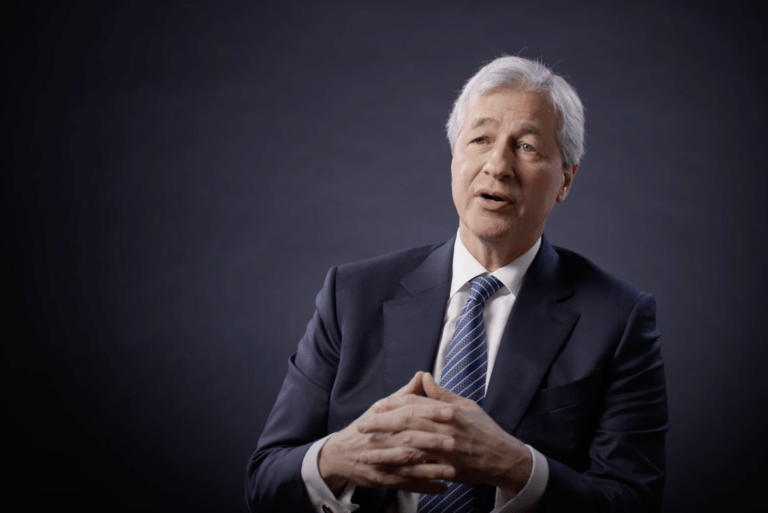On April 8, financial services giant JPMorgan Chase & Co. (NYSE: JPM) published its 2023 Annual Report, including letters to shareholders from its Chairman and CEO — Jamie Dimon — and other business heads. As of December 31, 2023, JPMorgan Chase reported possessing assets totaling $3.9 trillion and stockholders’ equity amounting to $328 billion.
In his 2023 Letter to Shareholders, Jamie Dimon, CEO of JPMorgan Chase, covered a wide range of topics, including global challenges, the U.S. economy’s resilience, the company’s financial performance, and its commitment to corporate responsibility.
Dimon began by addressing the numerous global challenges faced in 2023, such as the ongoing war and violence in the Middle East and Ukraine and growing geopolitical tensions with China. He emphasized the importance of America’s global leadership role and the need for unity among Western nations to protect essential freedoms, including free enterprise, during times of great crises.
Despite the unsettling landscape, including the previous year’s regional bank turmoil, Dimon noted that the U.S. economy continues to be resilient, with consumers still spending and markets expecting a soft landing. However, he cautioned that the economy is being fueled by large amounts of government deficit spending and past stimulus.
Dimon highlighted the growing need for increased spending as the U.S. continues transitioning to a greener economy, restructuring global supply chains, boosting military expenditure, and battling rising healthcare costs. He warned that this may lead to stickier inflation and higher rates than markets expect.
Furthermore, Dimon drew attention to the downside risks that should be watched. He pointed out that quantitative tightening is draining more than $900 billion in liquidity from the system annually, and the full effect of quantitative tightening on this scale has never truly been experienced. Additionally, he cautioned that the ongoing wars in Ukraine and the Middle East continue to have the potential to disrupt energy and food markets, migration, and military and economic relationships, in addition to their dreadful human cost.
In light of these significant and somewhat unprecedented forces, Dimon stated that JPMorgan Chase remains cautious. His comments underscore the need for vigilance and preparedness in the face of potential economic challenges, even as the U.S. economy demonstrates resilience in the current environment.
Despite the unsettling landscape, JPMorgan Chase delivered another strong year in 2023, generating record revenue for the sixth consecutive year and setting numerous records across its lines of business. The company earned $162.4 billion in revenue and $49.6 billion in net income, with a return on tangible common equity (ROTCE) of 21%. The firm also increased its quarterly common dividend twice during the year and continued to reinforce its fortress balance sheet.
Dimon highlighted the power of the company’s investment philosophy and guiding principles, as well as the value of being there for clients in both good and bad times. This approach resulted in continued growth across the firm, with Consumer & Community Banking (CCB), Corporate & Investment Bank (CIB), Commercial Banking (CB), and Asset & Wealth Management (AWM) all achieving significant milestones and gaining market share.
The letter also emphasized JPMorgan Chase’s role in advancing economic growth, extending credit, and raising capital totaling $2.3 trillion for its consumer and institutional clients worldwide. The company’s purchase of First Republic Bank was noted as a move that brought much-needed stability to the U.S. banking system while providing a secure home for over half a million First Republic customers.
In his letter, Dimon also looked at the profound impact that artificial intelligence (AI) is expected to have on JPMorgan Chase and society as a whole. He compared AI to some of the most transformative technological inventions in history, such as the printing press, steam engine, electricity, computing, and the Internet.
Dimon highlighted the company’s significant investment in AI over the past decade, with more than 2,000 AI/machine learning (ML) experts and data scientists now part of the organization. JPMorgan Chase has been actively using predictive AI and ML in various areas, such as marketing, fraud, and risk, with over 400 use cases currently in production. The company is also exploring the potential of generative AI (GenAI) in software engineering, customer service, operations, and employee productivity.
While AI is expected to augment virtually every job at JPMorgan Chase, Dimon acknowledged that it may reduce certain job categories or roles while creating others. The company is committed to retraining and redeploying talent to ensure that employees are taken care of if they are affected by this trend.
Dimon also talked about the importance of high-quality, easily accessible data in conjunction with AI to fuel better insights and improve risk management and customer service. To reflect the critical role of AI in the company’s future, JPMorgan Chase created a new position called Chief Data & Analytics Officer, which sits on the Operating Committee and reports directly to Daniel Pinto and Jamie Dimon.
Dimon acknowledged the risks associated with AI and the need for rigorous management, including maintaining the highest ethical standards, ensuring transparency, and countering potential biases. He also mentioned the threat of bad actors using AI to infiltrate companies’ systems and the incorporation of AI into JPMorgan Chase’s toolset to counter these threats.
Featured Image via YouTube (JPMorgan Channel)









